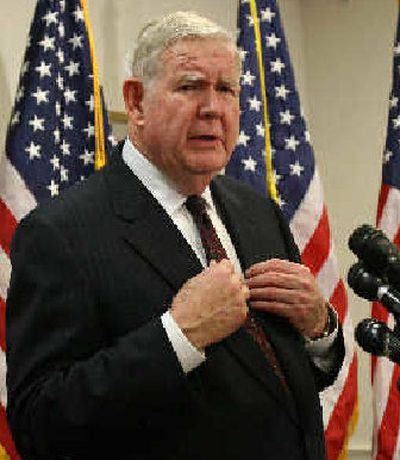Murtha urges pullout from Iraq

WASHINGTON – Rep. John Murtha, a hawkish Marine Corps veteran and one of the Democratic Party’s most respected military experts, called Thursday for immediately withdrawing U.S. troops from Iraq, pushing the debate over President Bush’s war policies to new heights of intensity and vitriol.
“Our military’s done everything that has been asked of them,” he said. “The U.S. cannot accomplish anything further in Iraq militarily. It’s time to bring the troops home.”
In staking out such a strong stance, the steel-country centrist from western Pennsylvania gave Democrats a sober, pro-military voice to argue the case against the war. Murtha sided with his party’s liberal wing, not with Democrats who want a phased pullout or want Bush to set a departure timetable.
Murtha, a Vietnam veteran, joins a growing number of military veterans in Congress who are putting the administration on the defensive about the war and related policies. Some critics think growing skepticism about the war throughout the country is pushing Congress to a tipping point, illustrated this week by a bipartisan Senate resolution calling for the president to spell out an exit strategy from Iraq.
“We’re the targets,” Murtha said in a speech in the Capitol. “We’re uniting the enemy against us. And there’s terrorism all over the world that there wasn’t before we went into Iraq.
“This is a policy wrapped in an illusion.”
Murtha called for American troops to start pulling out immediately after the Iraqi elections Dec. 15. He predicted that a careful withdrawal would take about six months. He said the troop presence should be replaced with a Marine quick-reaction force, possibly based in Kuwait.
In harsh personal terms, Murtha rebuked Bush and Vice President Dick Cheney for their aggressive new campaign to denounce war critics. Murtha compared his own combat experience with Bush’s service in the Texas Air National Guard and Cheney’s draft avoidance during the Vietnam War.
“I like guys who’ve never been there that criticize us who’ve been there,” he said. “I like that. I like guys who got five deferments and never been there and send people to war, and then don’t like to hear suggestions about what needs to be done. I resent the fact, on Veterans Day, he (Bush) criticized Democrats for criticizing them.”
Murtha’s tone illustrated the rising decibel level in Washington over the war. House Speaker Dennis Hastert, R-Ill., said Murtha and Democratic leaders “have adopted a policy of cut and run. … Representative Murtha and other Democrats want us to retreat. They want us to wave the white flag of surrender to the terrorists of the world.”
Even some Democratic friends of Murtha said he’d gone too far.
Rep. Ike Skelton of Missouri, the top Democrat on the House Armed Services Committee, said: “Jack is reflecting a lot of the frustration that Americans have with the slow progress.”
Skelton has recommended that troops be withdrawn gradually, based on Iraqis’ ability to take over their own security. Under Skelton’s plan, one U.S. battalion of about 3,000 to 5,000 troops would be withdrawn for every two Iraqi battalions that are ready to act independently.
With Bush’s public-approval rating at new lows amid mounting public opposition to the war, the administration’s Iraq policies have come under increasing scrutiny in Congress. Lawmakers from both parties not only are criticizing the conduct of the war, they also have tried to restrain administration policy on treatment of detainees.
Leading that criticism are Republicans and Democrats who’ve worn military uniforms.
Sen. John McCain, R-Ariz., a former Navy pilot who was imprisoned and tortured in North Vietnam, pushed the Senate into a 90-9 vote banning inhumane and degrading treatment of detainees, over Cheney’s strong objections. Joining McCain were Sen. Lindsey Graham, R-S.C., a colonel in the Air Force Reserves and a military lawyer, and Sen. John Warner, R-Va., a Marine veteran and secretary of the Navy during the Vietnam War.
The stands for and against the war still fall generally along Republican and Democratic lines. But Rep. Walter Jones of North Carolina, the lone Republican in the House of Representatives to call for immediate withdrawal from Iraq, said the role played by former military men put the war “in a different environment for debate.”
Murtha already had been leading an effort to win House support for McCain’s anti-torture language. But his hard-hitting, very public defiance of the administration was out of character for a lawmaker who prefers to work in the quiet corners of the House chamber rather than in the glare of TV lights.